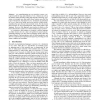Free Online Productivity Tools
i2Speak
i2Symbol
i2OCR
iTex2Img
iWeb2Print
iWeb2Shot
i2Type
iPdf2Split
iPdf2Merge
i2Bopomofo
i2Arabic
i2Style
i2Image
i2PDF
iLatex2Rtf
Sci2ools
ICFP
2008
ACM
2008
ACM
Typed iterators for XML
XML transformations are very sensitive to types: XML types describe the tags and attributes of XML elements as well as the number, kind, and order of their sub-elements. Therefore, operations, even simple ones, that modify these features may affect the types of documents. Operations on XML documents are performed by iterators that, to be useful, need to be typed by a kind of polymorphism that goes beyond what currently exists. For this reason these iterators are not programmed but, rather, hard-coded in the language. However, this approach soon reaches its limits, as the hard-coded iterators cannot cover fairly standard usage scenarios. As a solution to this problem we propose a generic language to define iterators for XML data to be grafted on some host programming language. We show that our language mostly offers the required degree of polymorphism, study its formal properties, and show its expressiveness and practical impact by providing several usage examples and encodings.
Hard-coded Iterators | Host Programming Language | ICFP 2008 | Programming Languages | Standard Usage Scenarios |
Related Content
| Added | 13 Dec 2009 |
| Updated | 13 Dec 2009 |
| Type | Conference |
| Year | 2008 |
| Where | ICFP |
| Authors | Giuseppe Castagna, Kim Nguyen |
Comments (0)

